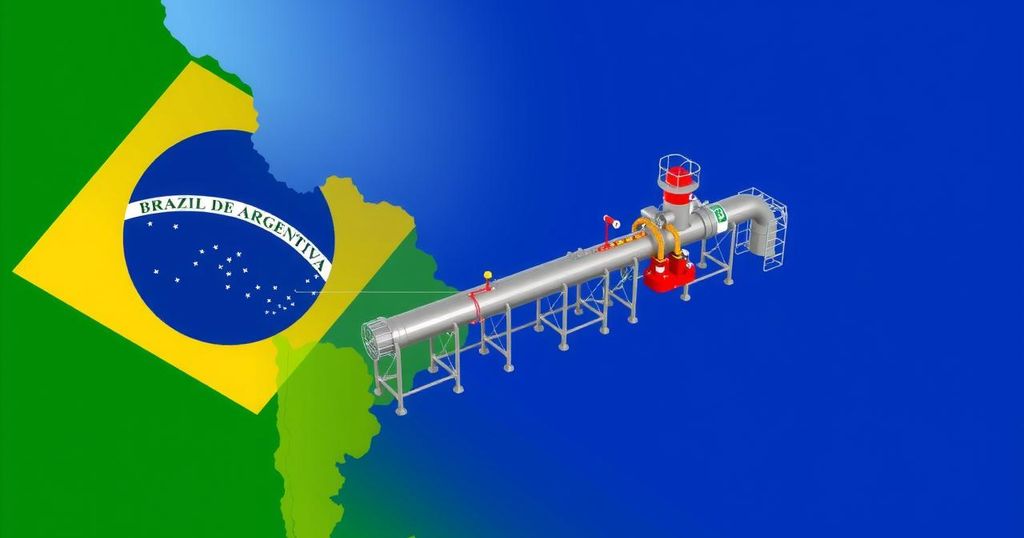Brazil’s Grupo Matrix Energia and Argentina’s TotalEnergies have partnered with Bolivia’s YPFB to transport gas from Argentina’s Vaca Muerta shale. This agreement aims to leverage Bolivia’s transport infrastructure amidst changing gas supply dynamics. Additionally, YPF is consolidating its LNG project to boost production and enhance Argentina’s stature in the global energy market.
Brazil’s Grupo Matrix Energia and Argentina’s TotalEnergies have solidified a partnership with Bolivia’s state energy firm, YPFB, to facilitate the transportation of natural gas sourced from Argentina’s prolific Vaca Muerta shale formation. This agreement, signed on November 22, aims to optimize the region’s gas supply amid shifting dynamics by leveraging Bolivia’s extensive transport infrastructure. YPFB highlighted that this initiative is vital in enabling the flow of Argentine gas to Brazil, promoting energy integration in the region.
As Bolivia’s exports have declined, Argentina and Brazil are compelled to identify alternative routes for energy supply. Notably, Argentina is emerging as a significant gas exporter, owing to its position as possessing the second-largest shale gas reserves worldwide, although it is currently establishing the required pipeline networks and frameworks needed for tariff negotiations. Under the agreement, YPFB’s gas transport companies will oversee the management of natural gas via its current 1,000 km pipeline that interconnects Argentina and Brazil.
In tandem with the transportation deal, TotalEnergies and Matrix Energia have also entered into a purchase and sales contract. Furthermore, YPFB announced that TotalEnergies has secured two permits to export natural gas from both the Austral and Neuquen Basins to Brazil. Additionally, YPF, another key player in the arena, is reportedly merging its liquefied natural gas (LNG) project with an initiative spearheaded by Pan American Energy Group and Golar LNG, a move anticipated to enhance production and export levels from the Vaca Muerta formation, thus bolstering Argentina’s competitiveness in the global LNG market.
Furthermore, YPF aims to secure $2 billion (equivalent to 2.02 trillion pesos) for its Vaca Muerta Sur pipeline project by the second quarter of 2025. This initiative is designed to transport an additional 390,000 barrels per day of oil from the Vaca Muerta formation to a coastal export terminal situated in the Rio Negro province of Argentina, with Vaca Muerta Oil Sur, a YPF-controlled entity, leading the endeavor.
The collaboration between Brazil, Argentina, and Bolivia emphasizes the evolving landscape of energy supply in South America. Historically, Bolivia was a significant natural gas exporter; however, declining production has necessitated strategic partnerships among neighboring nations. Argentina’s Vaca Muerta, one of the largest shale formations globally, offers substantial potential for gas exports. The region’s further integration thus relies on effective transportation solutions, particularly through Bolivia’s infrastructure, which aims to bolster energy security for Brazil and optimize resource utilization for Argentina as it seeks to enhance its export capabilities.
In summary, the partnership between Brazil’s Grupo Matrix Energia, Argentina’s TotalEnergies, and YPFB marks a pivotal step towards reshaping the natural gas landscape in South America. By leveraging Bolivia’s transport infrastructure, they aim to create a reliable supply route for Argentine gas to Brazil, promoting regional energy integration. Moreover, ongoing projects and investment initiatives by YPF and other stakeholders underscore the strategic importance of Vaca Muerta in positioning Argentina as a prominent player in the global LNG market.
Original Source: www.offshore-technology.com






